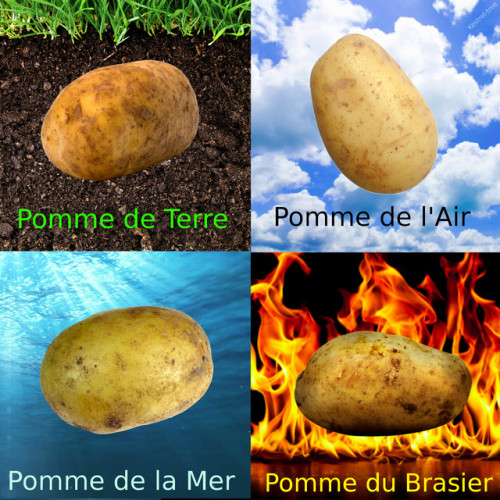Ne Forget Pas Les Quatres Food Groupes Mes Amis!

Ne forget pas les quatres food groupes mes amis!
More Posts from Littlelanguagefox and Others
Diary Writing in French
cher journal - dear diary
- you can talk about how your day was - this is a great opportunity to apply your knowledge of past tenses.
How to say that you had a good day -
j’ai passé une très bonne journée
j’ai passé une excellente journée
j’ai passé une belle journée
j’ai eu une merveilleuse journée
j’ai passé une journée fantastique
How to say that you had a bad day -
Je n’ai pas eu une bonne journée
j’ai eu une journée affreuse - a really bad day
j’ai eu une mauvaise journée
j’ai passé une journée difficile
How to say that you had a busy day -
j’ai eu une journée des plus occupés
j’ai eu une journée chargée
la journée d’aujourd’hui s’est avérée fort occupée
How to say that you had a quiet/relaxing day -
j’ai eu une journée tranquille
j’ai passé une journée tranquille
j’ai profité d’une journée de détente
Talking about time -
hier - yesterday
hier soir - last night
hier matin - yesterday morning
hier après-midi - yesterday afternoon
demain - tomorrow
demain matin - tomorrow morning
demain après-midi - tomorrow afternoon
demain soir - tomorrow evening
le lendemain - the next day
cette semaine - this week
la semaine dernière - last week
la semaine prochaine - next week
ce mois-ci - this month
le mois dernier - last month
le mois prochain - next month
cette année - this year
l’année dernière - last year
l’année prochaine - next year
when talking about a coming day e.g. next saturday = samedi prochain/le samedi suivant
To add a dash of drama -
et mon cul, c’est du poulet ? - yeah right!
faire du cinéma - to be a drama queen
j’ai du mal à croire que - I can’t believe that
jai vraiment foiré sur ce coup là - I really stuffed up!
je n’arrive pas à y croire ! - I can’t believe it
je n’en crois pas mes yeux - I can’t believe my eyes
je n’en reviens pas ! - I can’t believe it!
mon cul ! - my arse! (when you don’t believe someone, say if they’ve been lying to you)
Let me know if there is anything that you think I should add or if there are any corrections:)
Phrasal verbs › alphabetical list : C.
Call for › demander/réclamer.
Call in › faire appel à quelqu’un/obliger quelqu’un à rembourser sa dette.
Call off › annuler.
Call on someone › rendre visite à/faire appel à quelqu’un.
Call out › crier/appeler.
Call up (a file) › appeler/ouvrir (un fichier).
Care for › s’occuper de.
Carry on › continuer.
Carry out › réaliser.
Get carried away by › s’emballer pour quelque chose.
Carry forward › reporter.
Carry off (an award) › remporter (un prix).
Carry through › mener à bonne fin/aider à réussir.
Cash in › se faire rembourser.
Cash up › faire la caisse.
Catch up › rattraper.
Catch on › devenir populaire/prendre.
Catch out › prendre en défaut/démasquer.
Cave in › s’effondrer/céder.
Change over (to) › passer à.
Check up on/check out › vérifier.
Check in (airport) › se présenter à l’enregistrement.
Check out (hotel) › payer sa note et partir.
Clean up › nettoyer/faire fortune/faire son beurre.
Clean (someone) out › nettoyer à fond/mettre quelqu’un à sec/dévaliser.
Close down › fermer définitivement.
Close in on › cerner.
Too many phrasal verbs with To come, find it special post here.
Conjure up › évoquer.
Cut across › toucher (pas au sens physique).
Cut back › réduire/diminuer.
Cut down (on) › réduire.
Cut off › couper/déshériter.
(feel) cut off › se sentir isoler.
(be) cut out for › avoir des dispositions pour quelque chose.
To (be) cut up › être très affecté.






reminder to self: stop waiting to feel ready. you’re not going to feel ready until you’re doing the thing you’re waiting to feel ready for. start doing it and the readiness will come






it doesn’t matter how long it takes, just keep going, you’re doing great
Yeah sex is great but have you ever listened to a song in your target language and suddenly understood a new line for the first time
That “Time of the Month” Vocab

Vocab
생리 / 월경 - period/menstruation
그날 - that day (slang for period)
대자연 - mother nature (slang for period)
달걸이 - that time of the month (slang for period)
생리통 / 월경통 - period cramps/menstrual cramps/pain
생리토 약 / 월경통 약 - period cramp medication
생리대 - sanitary napkin/pad
생리컵 - menstrual cup
탐폰 - tampon
팬티 라이너 - panty liner
활동형 - active (like the style for tampons/pads)
생리양 / 양 - menstrual flow
산아 제한 - birth control
새다 - to leak
심하다 - to be severe
Phrases
생리가 늦어요 - My period is late
생리가 일찍 시작했어요 - My period started early
생리가 불규칙해요 - My period is irregular
생리를 했어요. - I got my period
저는 지금 생리 중이에요 - I’m on my period now
생리를 시작한 것 같아요 - I think my period started
생리대는 어디서 사나요? - Where can I buy a pad?
양이 많은 날에는 샐까봐 불안해서 1시간에 한 번씩 화장실을 들락거길 정도였으니까요. - She was afraid of leaks on heavy (flow) days, so she would go to the bathroom every hour.
심한 생리통이 있어요 - I have severe cramps
산아 제한을 먹는 걸 깜빡했어요 - I forgot to take my birth control
Brands in Korea
**keep in mind, pads are the main sanitary product used in Korea. You can find the others, but there are definitely fewer options**
시크릿데이 - Secret Day
순면커버 - Pure Cotton Cover (its actually a type from the brand Wow, but I know many people that use these specific ones)
텐셀 - Tencil
사임당 - Saimdang
fun project for linguists who don’t have many hobbies: every time you realise that you specifically like or don’t like a certain word, put it on a list. at the end of the year, analyse it for linguistic patterns
things to say to your loved ones & significant others in korean

greetings:
안녕 내 사랑 (annyeong nae sarang) - hi my love 여보 (yeobo) - honey
phrases to use every day:
보고 싶어 (bogo sipeo) - i miss you/ i want to see you 미소가 정말 그리워 (misoga jeongmal geuliwo) - i really miss your smile 사랑해 (saranghae) - i love you 진심으로 사랑해 (jinsimeulo saranghae) - i love you with my whole heart 말로 표현할 수 없을 만큼 사랑해 (mallo pyohyeonhal su eopseul mankeum saranghae) - i love you more than words can say 당신을 많이 사랑해요 (dangsineul manhi saranghaeyo) - i love you a lot 안아주고 싶어 (anajugo sipeo) - i want to hug you 안아 줘 (ana jwo) - give me a hug 뽀뽀해 줘 (ppoppohae jwo) - kiss me please
things you can say more often:
예쁘네요 (yeppeuneyo) - you are pretty 귀여워요 (gwiyeowoyo) - you are cute 당신은 대단해요 (dangsineun daedanhaeyo) - you are amazing 멋지시네요 (meotj shineyo) - you look great 당신은 웃을때 잘생겼어요 (dangsineun useulttae jalsaenggyeosseoyo) - you are handsome when you smile 님은 제게 영감을 주시는 분이세요 (nimeun jege yeonggameul jusineun buniseyo) - you are my inspiration 나는 당신이 자랑스러워요 (naneun dangsini jarangseuleowoyo) - i am proud of you 제가 팬인게 정말 자랑스러워요 (jega paeninge jeongmal jalangseuleowoyo) - i am so proud to be your fan
make sure they are okay:
별일 없지? (byeolil eobji) - is everything alright? 힘내세요! (himnaeseyo) - cheer up! 푹 쉬세요 (pug swiseyo) - rest well 잘 먹어요 (jal meogeoyo) - eat well 너 아직 먹었 니? (neo ajig meog-eo ni) - have you eaten yet? 감기 조심해요 (gamgi josimhaeyo) - be careful of the cold 무리해서 일하지 마 (mulihaeseo ilhaji ma) - don’t overwork yourself 건강하게 계세요 (geonganghage gyeseyo) - stay healthy 제발 스스로 돌봐 (jebal seuseulo dolbwa) - please take care of yourself
phrases to remember:
너랑 더 오래 같이 있고 싶어 (neorang deo olae gati issgo sipeo) - i would like to spend more time with you 난 항상 응원 할게요 (nan hangsang eungwon halgeyo) - i will always cheer for you/ support you 오빠/언니 힘내세요 우리가 있자나요 (oppa/unnie himnaeseyo uriga issjanayo) - oppa/ unnie cheer up, we are by your side 항상 행복하세요 (hangsang haengboghaseyo) - always be happy 실수해도 괜찮아요 (silsuhaedo gwaenchanhayo) - it’s okay if you make a mistake 울지 마세요 (ulji maseyo) - please don’t cry 점점 나아질거야 (jeomjeom naajilgeoya) - it will get better 지금은 힘들어도 지나고 보면 아무것도 아닐거야 (jigeumeun himdeuleodo jinago bomyeon amugeosdo anilgeoya) - although it is tough now, it will be nothing once you’ve done it 너는 네 어두운 세상에 빛이에요 (neoneun ne eoduun sesange bichieyo) - you are the light in my dark world
내게 있어 당신은 온 세상을 의미해요!! (naege isseo dangsineun on sesangeul uimihaeyo) - you mean the world to me!!
Korean interrogatives:
뭐- what
어디- where
누구- who
언제- when
왜- why
어떻게- how
몇- how many
얼마- how much
얼마나- how long
-
 greatestandpowerfullestflipsy reblogged this · 1 month ago
greatestandpowerfullestflipsy reblogged this · 1 month ago -
 greatestandpowerfullestflipsy liked this · 1 month ago
greatestandpowerfullestflipsy liked this · 1 month ago -
 kasshata93 liked this · 1 month ago
kasshata93 liked this · 1 month ago -
 pinkiepuunk liked this · 1 month ago
pinkiepuunk liked this · 1 month ago -
 salty-and-spiraling liked this · 2 months ago
salty-and-spiraling liked this · 2 months ago -
 xtreme-cringe-warning reblogged this · 2 months ago
xtreme-cringe-warning reblogged this · 2 months ago -
 fivethousandantsinabox reblogged this · 2 months ago
fivethousandantsinabox reblogged this · 2 months ago -
 technecis liked this · 2 months ago
technecis liked this · 2 months ago -
 atadoddinnit reblogged this · 3 months ago
atadoddinnit reblogged this · 3 months ago -
 chocoholic-pigeon liked this · 3 months ago
chocoholic-pigeon liked this · 3 months ago -
 shadytrees24 liked this · 3 months ago
shadytrees24 liked this · 3 months ago -
 enomie liked this · 3 months ago
enomie liked this · 3 months ago -
 safetypinserenade-remade liked this · 3 months ago
safetypinserenade-remade liked this · 3 months ago -
 but1ur liked this · 3 months ago
but1ur liked this · 3 months ago -
 flicker--away liked this · 4 months ago
flicker--away liked this · 4 months ago -
 briassreblogs reblogged this · 4 months ago
briassreblogs reblogged this · 4 months ago -
 special-little-trash-bin reblogged this · 4 months ago
special-little-trash-bin reblogged this · 4 months ago -
 kodamark liked this · 4 months ago
kodamark liked this · 4 months ago -
 demonkitchen reblogged this · 4 months ago
demonkitchen reblogged this · 4 months ago -
 belovedhades reblogged this · 4 months ago
belovedhades reblogged this · 4 months ago -
 belovedhades liked this · 4 months ago
belovedhades liked this · 4 months ago -
 pr-og reblogged this · 4 months ago
pr-og reblogged this · 4 months ago -
 pr-og liked this · 4 months ago
pr-og liked this · 4 months ago -
 pandaslowpoke reblogged this · 4 months ago
pandaslowpoke reblogged this · 4 months ago -
 pandaslowpoke liked this · 4 months ago
pandaslowpoke liked this · 4 months ago -
 aphfroghat liked this · 4 months ago
aphfroghat liked this · 4 months ago -
 k3llyb3an reblogged this · 4 months ago
k3llyb3an reblogged this · 4 months ago -
 kira-quartz reblogged this · 4 months ago
kira-quartz reblogged this · 4 months ago -
 servilepsychopath reblogged this · 4 months ago
servilepsychopath reblogged this · 4 months ago -
 servilepsychopath liked this · 4 months ago
servilepsychopath liked this · 4 months ago -
 rubytactician reblogged this · 4 months ago
rubytactician reblogged this · 4 months ago -
 questcult liked this · 5 months ago
questcult liked this · 5 months ago -
 chrissamaxwell reblogged this · 6 months ago
chrissamaxwell reblogged this · 6 months ago -
 chrissamaxwell liked this · 6 months ago
chrissamaxwell liked this · 6 months ago -
 miss-rum-hee reblogged this · 6 months ago
miss-rum-hee reblogged this · 6 months ago -
 stopthecheese liked this · 6 months ago
stopthecheese liked this · 6 months ago -
 guinnessandsexyaccents reblogged this · 6 months ago
guinnessandsexyaccents reblogged this · 6 months ago -
 runawaytrainofwhat reblogged this · 8 months ago
runawaytrainofwhat reblogged this · 8 months ago -
 pelirroja-peligrosa liked this · 8 months ago
pelirroja-peligrosa liked this · 8 months ago -
 opal-serpent reblogged this · 8 months ago
opal-serpent reblogged this · 8 months ago -
 vehiculartheyslaughter liked this · 9 months ago
vehiculartheyslaughter liked this · 9 months ago -
 earthmoonlotus reblogged this · 9 months ago
earthmoonlotus reblogged this · 9 months ago -
 earthmoonlotus liked this · 9 months ago
earthmoonlotus liked this · 9 months ago -
 nuclearpastaaldente liked this · 9 months ago
nuclearpastaaldente liked this · 9 months ago -
 birdofkarma reblogged this · 9 months ago
birdofkarma reblogged this · 9 months ago -
 thatsroughbuddyzuko reblogged this · 9 months ago
thatsroughbuddyzuko reblogged this · 9 months ago -
 manypastfrustrations reblogged this · 9 months ago
manypastfrustrations reblogged this · 9 months ago
